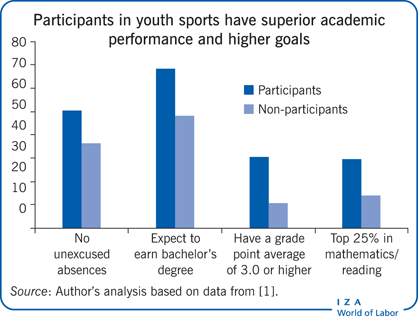Elevator pitch
In response to declining budgets, many school districts in the US have reduced funding for sports. In Europe, parents may respond to difficult economic times by spending less on sports clubs for their children. Such cuts are unwise if participating in sports is an investment good as well as a consumption good and adds to students’ human capital. The value of sports is hard to measure because people who already possess the skills needed to succeed in school and beyond might be more likely to participate in sports. Most studies that account for this endogeneity find that participation in youth sports improves academic and labor market performance.

Key findings
Pros
Youth sports are an investment good as well as a consumption good.
Time spent in youth sports adds to cognitive skills, such as performance on standardized exams in school.
Time spent in youth sports adds to non-cognitive skills, such as self-discipline and the ability to work with others, which improve performance in the labor market.
Enhanced human capital improves performance in school and in the labor market.
Sports form part of a school district’s or local government’s core mission.
Cons
Youth sports are strictly a consumption good that has no positive impact on performance elsewhere.
Time spent away from academic studies diminishes students’ cognitive skills, which worsens their performance in school.
Time spent away from academic studies diminishes the accumulation of non-cognitive skills that are valued by employers.
Participating in youth sports worsens performance in school and the labor market.
Funding youth sports is a waste of public resources.